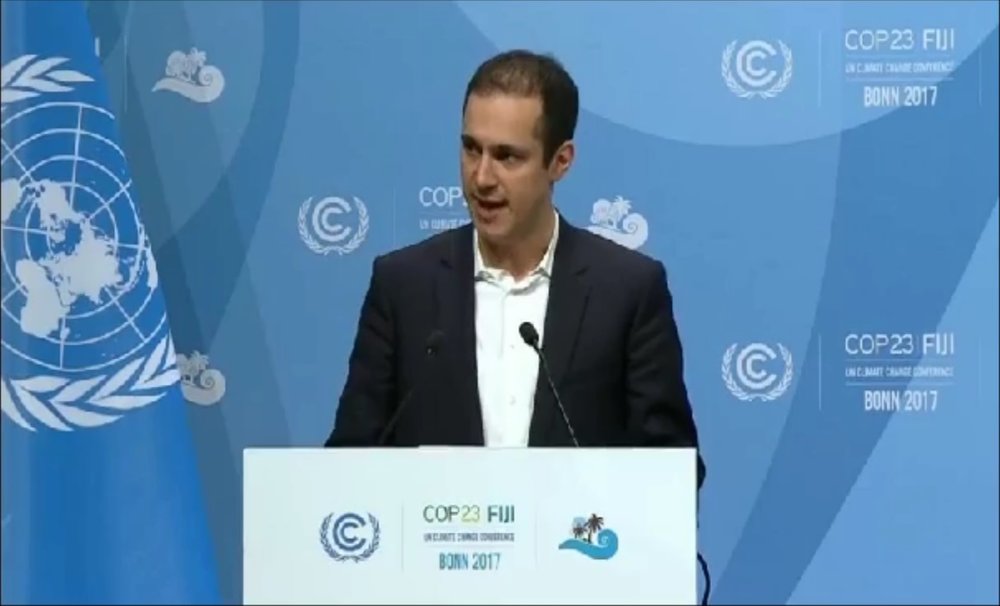Iran proposes inclusion of water-related issues in COP 24

TEHRAN — In its country statement at Bonn Climate Change Conference (COP 23) Iran has proposed the inclusion of the issue of water in the agenda of COP 24.
The statement which was made by Kaveh Madani, deputy head of the Department of Environment on Research and Education and acting head of International Affairs and Conventions, was delivered in the High-Level Segment of United Nations Climate Change Conference (UNFCCC) on November 16, 2017 in Bonn, Germany.
Water scarcity which has been largely overlooked in the climate change negotiations as well as the Paris agreement is a serious threat to food security with significant socio-economic implications that will be exacerbated by climate change, the statement said.
“Iran’s energy transition provides a very competitive market for those interested in increasing energy efficiency and renewable energy development. Iran’s INDC is very candid and offers attractive financial incentives for foreign investors to join in partnership.”
“This, combined with water and weather-related extreme events such as droughts, floods, hurricanes, and sand and dust storms have put the health of livelihood of a large portion of the world’s population at great risk. Believing in the need for adopting a nexus approach in developing sustainable solutions to climate change, we propose that the issue of water to be included in the agenda of COP 24,” Madani stated in the High-Level Segment of the COP24.
“We are all pleased to see that there is, finally, a global consensus about the need to act strongly to mitigate climate change and to adapt to its impacts,” he said in the statement, adding, “Reaching this consensus was not a trivial task. While we deserve celebrating this success, we should not forget that the next step is even more challenging. We often get too busy negotiating over the targets that we forget that we also need means and realistic pathways to the end goal.”
“The major unresolved issues now are designing effective policies to change the current development model, to share the burden as to who pays for the economic costs of policy change, to balance environmental and development policies, to reflect fairness in obligations and in payments for costs of change, and to provide developing countries with the means of implementation, particularly finance and technology transfer,” the statement continued.
The statement further explained that “We must put more efforts into identifying feasible paths and processes that can help us address climate change in a fair and cooperative manner based on two fundamental principles. First, because of their historical responsibility for global warming, the developed countries must take the lead in mitigation and in providing finance and technology to developing countries without shifting the burden onto these countries. Second, benefiting from the finance and technology provided by the developed counterparts, the developing countries should take responsible climate actions, but not at the expense of their economic and social development.”
Four decades of international and extraterritorial sanctions have had a multiplier effect on the adverse impacts of climate change on Iran, resulting in environmental degradation.
Moreover Iran’s Head of delegation stated that “these key principles are in the provisions of the UNFCCC and the Kyoto Protocol and the Islamic Republic of Iran has defended them strongly throughout the negotiations that led to the Paris Agreement. We strongly believe that unless these principles are fully respected, we just add more targets to our already ambitious agendas of sustainable development, eradication of poverty, proliferation of health and education, etc. without developing the mechanisms that enable us to solve our shared problems through fair cooperation.”
“Movement to a low-carbon economy is one of the environmental mandates of our Supreme Leader [Ayatollah Seyyed Ali Khamenei]. In this movement, as an intermediary step, we have already replaced liquid fuels with natural gas and we plan to further increase the share of this resource as well as nuclear and renewable energies in our energy mix, in line with our economic diversification goals,” the statement read.
“Iran’s energy transition provides a very competitive market for those interested in increasing energy efficiency and renewable energy development. Iran’s INDC is very candid and offers attractive financial incentives for foreign investors to join in partnership.”
Madani further regretted that “four decades of international and extraterritorial sanctions have had a multiplier effect on the adverse impacts of climate change on Iran, resulting in environmental degradation. The imposition of unilateral coercive economic measures contrary to the international law by some developed countries as well as the politicization of GEF [Global Environment Facility] and GCF [Green Climate Fund] decrease the countries’ ability to cope with the adverse impacts of climate change and violate the rights of many people.
“In transforming Iran’s INDC [Intended Nationally Determined Contributions] into her first NDC [Nationally Determined Contributions], particularly building on the nuclear deal (JCPOA) and elevated engagement of European and Asian partners, Iran’s future plan shall stand ambitious in harmony with the global move and heavily rely on the full implementation of the JCPOA and unhindered financial and technological transactions and transfers. The Islamic Republic of Iran honors its commitments and promises that are fair, balanced and constructive, and help us keep the delicate balance of national development and greenhouse gas emissions reduction,” Madani noted.
“Progress in COP negotiations gives us hope. But we all need to work together to preserve our shared planet. Indeed, we have an obligation to contribute our fair share to this moral imperative,” the statement concluded.
MQ/MG
Leave a Comment